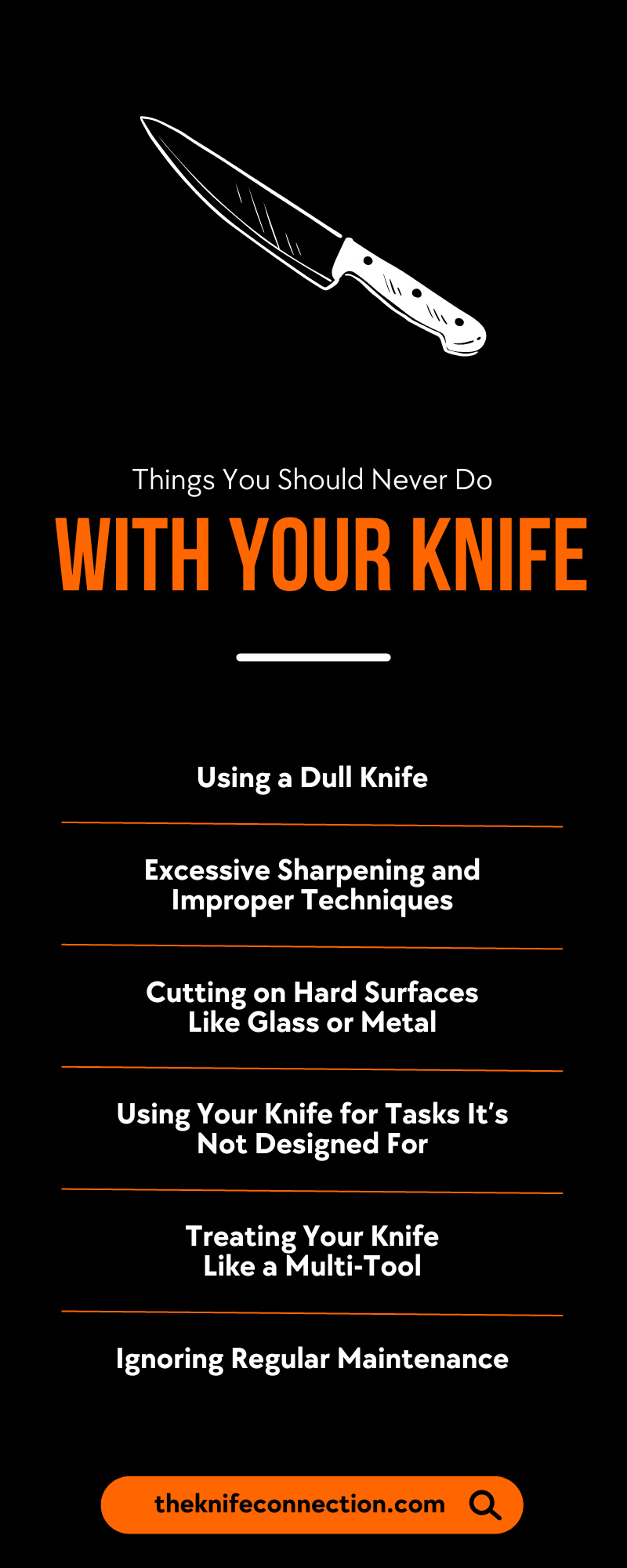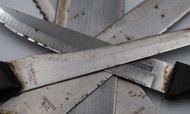Things You Should Never Do With Your Knife
Aug 18 2023 - 8:30
As a responsible knife owner, knowing how to properly use and maintain your knife is important. However, there are also many things that you should never do with your knife, as they can lead to damage, dullness, and even injury. Here, we’ll explore the top things you should never do with your knife, offering insights on how to preserve your blade’s integrity, prevent accidents, and ensure a long-lasting tool.
Using a Dull Knife
Let’s start with one tip that many knife owners already know: never use a dull knife. In many cases, dull knives are more dangerous than sharp ones. To effectively use a dull knife, you’ll need to exert more pressure to perform a task, increasing the risk of the knife slipping and cutting you. Regularly inspect the blade for sharpness and use a reliable sharpening tool to keep it in optimal condition.
Excessive Sharpening and Improper Techniques
While you should keep your knife sharp to avoid the previous problem, excessive sharpening can wear down the blade, shortening its lifespan. Additionally, improper sharpening methods can cause damage to the blade’s edge. Consider using a sharpening tool specifically designed for your knife or consult an expert for advice on proper sharpening methods. Your knife will thank you, and you’ll achieve better, more consistent results.
Cutting on Hard Surfaces Like Glass or Metal
When using your knife to cut items, choosing the right surface is crucial. Hard surfaces, such as glass or metal countertops, can quickly dull or even chip your knife’s blade. Instead, opt for softer cutting surfaces like wooden or plastic cutting boards, which will provide a much-needed cushion for your knife, ultimately preserving its sharpness and helping prevent damage.
Using Your Knife for Tasks It’s Not Designed For
The purpose of a knife can vary greatly depending on the type you get, so understanding and respecting the intended purpose of your knife is crucial. For example, a fillet knife is designed for precision work with fish, so you shouldn’t use it to chop through thick cuts of meat or fibrous vegetables. Using your knife for tasks it’s not designed for can lead to extreme dullness or even breakage.
Treating Your Knife Like a Multi-Tool
Knives are designed for cutting, slicing, and other related tasks—not for prying, jabbing, or twisting. They’re not multi-tools. That means using your knife as a prying tool or a screwdriver can lead to an array of problems, such as a bent or damaged blade or a broken tip. In some cases, you could even hurt yourself when things go wrong. Instead, take the time to find the appropriate tool for your needs.
Ignoring Regular Maintenance
Just like any essential tool, your knife requires regular maintenance to keep it in top condition. Make it a habit to check your knife for any signs of damage, dullness, or rust. By regularly cleaning, sharpening, and protecting your knife, you’ll ensure it remains a reliable and effective tool for many years to come.
Neglecting the Handle
During your maintenance, putting all your focus on the blade is easy, but the handle is just as important. It deserves just as much care as the blade, if not more in some circumstances. Ignoring the handle can lead to degradation of the material, making it uncomfortable or even unsafe to hold. Ensure regular upkeep of the handle, including cleaning and routine inspections for any damage.
Running Your Knife Through a Dishwasher
A dishwasher might seem like an easy and convenient way to clean your knife, but it’s actually one of the worst ways to do so. The high water pressure, harsh detergents, and heat can wear away at your knife’s blade and handle over time, causing corrosion, discoloration, and even structural issues. Instead, always hand-wash your knife with mild soap and a soft sponge, then dry it thoroughly to prevent moisture-related damage.
Leaving Your Knife in a Wet or Dirty Condition
One of the crucial things you should never do with your knife is leave it wet or dirty after use. You must clean and dry your knife immediately after using it to prevent rust, staining, or corrosion. This proper hygiene also ensures your knife remains safe to use for food preparation if that’s what its intended purpose is. Even if it’s not, you should never rely on a germ-covered blade for regular use.
Storing Your Knife in a Drawer With Other Utensils
Storing your high-quality knife in a drawer alongside other utensils and metal items can lead to scratches, dents, and damage that will negatively impact your knife’s performance. Instead of throwing your knife in a drawer, invest in a knife block, magnetic strip, or blade sheath to protect it from harmful contact with other items.
Not Covering Your Knife Properly
Depending on the knife you get, it might fold up into itself for easy protection and storage. However, if you own a static knife, you should always use a protective cover for the blade. A knife sheath or blade guard is essential to preserve the sharpness and integrity of your knife. But more importantly, a guard also helps prevent accidental cuts and injuries from grabbing the knife or rummaging around in a drawer it’s in. Therefore, always cover your knives to avoid injuries.
Using Your Knife on Frozen Foods
When it comes to food preparation, one common misuse of knives is cutting or attempting to pry apart frozen foods. This practice can lead to a damaged or broken blade and the potential for personal injury. The hardness of frozen foods can be too much for most knife blades and can cause them to chip or snap. Therefore, you should always properly thaw foods before cutting into them. If you must separate frozen items, consider using a tool specifically designed for this purpose, like a cleaver or a thawing tray.
Sharing Your Knife Without Instruction
Even if you’re a knife expert, one mistake many people make is lending your knife to someone unaware of proper knife-handling techniques. This type of situation can lead to damage and accidents. Before allowing other people to use your knife, explain the necessary precautions and usage tips to ensure proper knife care and prevent accidents.
Expanding Your Collection With Improper Substitutes
Once you have one quality knife you enjoy using, it won’t take long for you to want to expand your collection. However, if you only buy cheap substitutes, you’ll default to your good knife all the time. That’s why you need to find a dealer you can trust. Fortunately, The Knife Connection is just that place. We have Great Eastern Cutlery knives for sale on our site, along with many other trusted brands. Take the time today to find some new knives that will expand your collection in a meaningful way.

